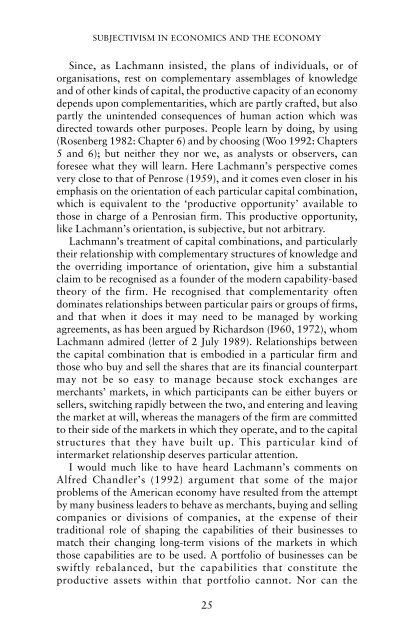Subjectivism and Economic Analysis: Essays in memory of Ludwig ...
Subjectivism and Economic Analysis: Essays in memory of Ludwig ...
Subjectivism and Economic Analysis: Essays in memory of Ludwig ...
You also want an ePaper? Increase the reach of your titles
YUMPU automatically turns print PDFs into web optimized ePapers that Google loves.
SUBJECTIVISM IN ECONOMICS AND THE ECONOMYS<strong>in</strong>ce, as Lachmann <strong>in</strong>sisted, the plans <strong>of</strong> <strong>in</strong>dividuals, or <strong>of</strong>organisations, rest on complementary assemblages <strong>of</strong> knowledge<strong>and</strong> <strong>of</strong> other k<strong>in</strong>ds <strong>of</strong> capital, the productive capacity <strong>of</strong> an economydepends upon complementarities, which are partly crafted, but alsopartly the un<strong>in</strong>tended consequences <strong>of</strong> human action which wasdirected towards other purposes. People learn by do<strong>in</strong>g, by us<strong>in</strong>g(Rosenberg 1982: Chapter 6) <strong>and</strong> by choos<strong>in</strong>g (Woo 1992: Chapters5 <strong>and</strong> 6); but neither they nor we, as analysts or observers, canforesee what they will learn. Here Lachmann’s perspective comesvery close to that <strong>of</strong> Penrose (1959), <strong>and</strong> it comes even closer <strong>in</strong> hisemphasis on the orientation <strong>of</strong> each particular capital comb<strong>in</strong>ation,which is equivalent to the ‘productive opportunity’ available tothose <strong>in</strong> charge <strong>of</strong> a Penrosian firm. This productive opportunity,like Lachmann’s orientation, is subjective, but not arbitrary.Lachmann’s treatment <strong>of</strong> capital comb<strong>in</strong>ations, <strong>and</strong> particularlytheir relationship with complementary structures <strong>of</strong> knowledge <strong>and</strong>the overrid<strong>in</strong>g importance <strong>of</strong> orientation, give him a substantialclaim to be recognised as a founder <strong>of</strong> the modern capability-basedtheory <strong>of</strong> the firm. He recognised that complementarity <strong>of</strong>tendom<strong>in</strong>ates relationships between particular pairs or groups <strong>of</strong> firms,<strong>and</strong> that when it does it may need to be managed by work<strong>in</strong>gagreements, as has been argued by Richardson (I960, 1972), whomLachmann admired (letter <strong>of</strong> 2 July 1989). Relationships betweenthe capital comb<strong>in</strong>ation that is embodied <strong>in</strong> a particular firm <strong>and</strong>those who buy <strong>and</strong> sell the shares that are its f<strong>in</strong>ancial counterpartmay not be so easy to manage because stock exchanges aremerchants’ markets, <strong>in</strong> which participants can be either buyers orsellers, switch<strong>in</strong>g rapidly between the two, <strong>and</strong> enter<strong>in</strong>g <strong>and</strong> leav<strong>in</strong>gthe market at will, whereas the managers <strong>of</strong> the firm are committedto their side <strong>of</strong> the markets <strong>in</strong> which they operate, <strong>and</strong> to the capitalstructures that they have built up. This particular k<strong>in</strong>d <strong>of</strong><strong>in</strong>termarket relationship deserves particular attention.I would much like to have heard Lachmann’s comments onAlfred Ch<strong>and</strong>ler’s (1992) argument that some <strong>of</strong> the majorproblems <strong>of</strong> the American economy have resulted from the attemptby many bus<strong>in</strong>ess leaders to behave as merchants, buy<strong>in</strong>g <strong>and</strong> sell<strong>in</strong>gcompanies or divisions <strong>of</strong> companies, at the expense <strong>of</strong> theirtraditional role <strong>of</strong> shap<strong>in</strong>g the capabilities <strong>of</strong> their bus<strong>in</strong>esses tomatch their chang<strong>in</strong>g long-term visions <strong>of</strong> the markets <strong>in</strong> whichthose capabilities are to be used. A portfolio <strong>of</strong> bus<strong>in</strong>esses can beswiftly rebalanced, but the capabilities that constitute theproductive assets with<strong>in</strong> that portfolio cannot. Nor can the25

















